Urban farms in Essex County, New Jersey are calling on municipal and state governments for long-term investment to combat food insecurity.
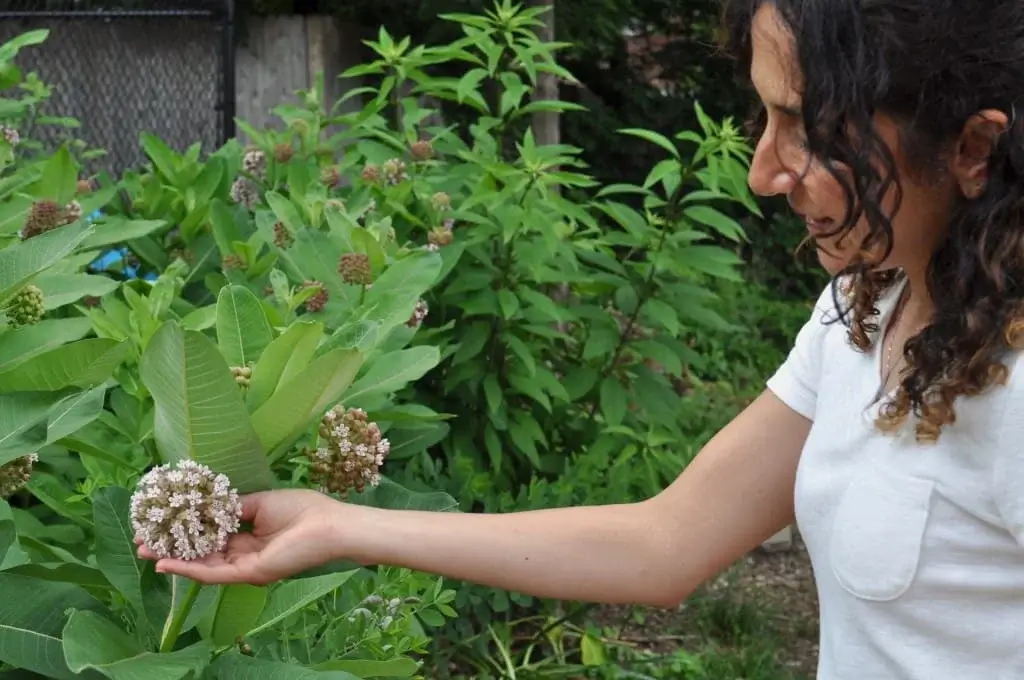
This article is part of a partnership between The Jersey Bee and Next City exploring segregation in Essex County, New Jersey, and the solutions to building a more just and equitable county and state.
In Montclair’s Third Ward is a tiny farm with big community value.
In the summertime, Montclair Community Farms transforms its less-than-10,000-square-foot lot into a space with something for everyone: a garden education program for children, a job training site for teens, and a pop-up produce market for Essex County residents.
“People really love being here,” said Lana Mustafa, executive director of Montclair Community Farms. “It’s really developed into something really beautiful and productive and community-oriented.”
On a breezy afternoon in early June, bunches of lettuce, bok choy, parsley, and garlic scapes begin to sprout and ripen. Some are even ready to harvest. Mustafa and her team are preparing inventory for their Monday farmers market, where several dozen shoppers use their SNAP or WIC benefits to buy fresh produce.
READ: How to apply for food aid and assistance in New Jersey
But Mustafa said serving Essex County residents isn’t easy when governments don’t consider urban farming as a viable solution to bring affordable, fresh food to food-insecure communities.
To do so, the state must confront its complicated history of farming and pair it with long-term municipal investments – steps that some argue New Jersey has yet to take.
“We need the state of New Jersey to take urban [agriculture] seriously,” said Mustafa.
Again and again, Mustafa says, red tape has hindered her small farm’s ability to serve its community. Because she doesn’t have at least five acres, her application to join the federal Senior Farmers’ Market Nutrition Program – which would have enabled her to accept food vouchers from low-income seniors – was denied four times. It was only after extensive advocacy with other community groups that the U.S. Department of Agriculture approved her application in 2023.
The high cost of a permit (up to $5,000 annually) forced her to end her composting program this spring.
“What happens to this food waste now that we can’t accept it? It has to go back to the landfill,” said Mustafa, whose farm collects more than 8,000 pounds of food waste annually.
Emilio Panasci, co-founder and executive director of the Urban Agriculture Cooperative, said it’s no coincidence that urban farms located in and around Essex County’s seven food deserts get little to no municipal support.
READ: How Essex County falls short on food access (and how you can help)
“Consumer food access mirrors our patterns of segregation in this country, and that is a political as well as economic choice,” said Panasci. “It’s no accident that outside of a few struggling small farms and pop-up markets in the South Ward of Newark, there is very little if any high-quality, fresh food options – and those are available at premium prices – in our neighboring Maplewood or South Orange.”
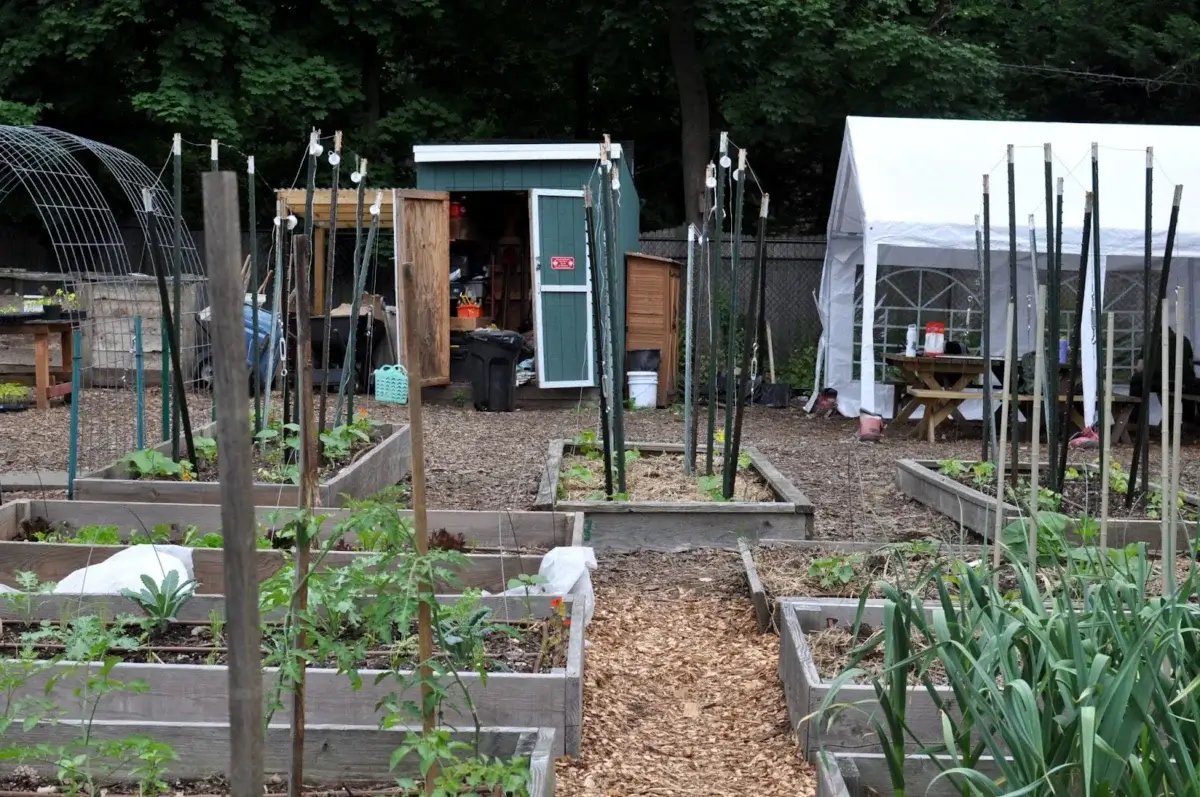
A photo of Montclair Community Farms’s garden beds, storage sheds, and community gathering area. Lana Mustafa said her farmer’s markets have grown from serving ten to hundreds of residents on federal food assistance programs in recent years. Photo by Kimberly Izar
Segregation in farming
While the practice of growing food can be traced back to Indigenous and Black agricultural practices, it was white farmers in New Jersey who benefitted the most from an agricultural economy built on slavery.
In the 1700s and 1800s, farmers in the “Garden State” relied on enslaved people to herd and slaughter animals, grow crops, maintain their meadowlands, and construct their farms. Even after slavery was abolished in New Jersey in 1866, white farmers created their own form of sharecropping called “cottaging,” where former enslaved Black people would provide labor in exchange for shelter and crops.
In her book Farming While Black, Leah Penniman details what happened next for farmers of color after Jim Crow and the passage of civil rights legislation.
“Urban farmers of color removed rubble, planted trees, installed vegetable beds, and built structures for community gatherings,” wrote Penniman about the rise of Black and Latinx farmers reviving agricultural traditions in the 1960s and 1970s.
Still, the legacy of segregation persists. A 2022 report from Rutgers University showed that urban farms in New Jersey tend to be clustered in areas with higher SNAP participation, where residents are more likely to be Black or Latinx. And in a county where white people make up less than one-third of the population, they own three-quarters of all urban farms in Essex County, according to a 2022 U.S. census of agriculture.
Fallon Davis, chair of the Black & Brown, Indigenous, Immigrant Farmers United (BIFU), said these inequities are “systemic by design.”
“We have to understand the system was never designed for Black and Brown people to live this long. It was never designed for us to thrive, survive, have families, and be these beautiful land beings.”
They explained the lack of support for urban farmers disproportionately targets Black neighborhoods in Essex County and perpetuates segregation.
“New Jersey hasn’t prioritized advocacy for urban farming, which would protect and feed Black folks,” they said.
Farming with no water on borrowed land
Several miles from Montclair Community Farms, Keven Porter’s farm in Newark has faced a slew of setbacks typical for urban farmers. For starters, he still lacks basic farming infrastructure – like running water.
More than a decade after establishing Rabbit Hole Farm, Porter is still trying to get the city of Newark to supply consistent water. For years, he’s had to call in favors from neighbors or ask the fire department to deliver water gallons.
“They’re just ignorant to the fact that we are a benefit,” said Porter, a Black farmer and Newark resident.
Porter and his partner co-founded Rabbit Hole Farm in 2013 through Newark’s Adopt-A-Lot program. Today, Rabbit Hole Farm is a 6,000-square-foot community hub in Newark’s South Ward that provides herbal education, wellness programs, and cooking classes to Newark residents, where more than half of its public school students are eligible for free or reduced lunch programs.
Porter’s farm faces another common challenge: he doesn’t own his farmland. Through Newark’s Adopt-A-Lot program, residents can use the city’s vacant lots but not own them, regardless of how long they’ve been tending to them.
Fallon Davis of BIFU also has a farm in Newark, run by their youth education nonprofit STEAM URBAN. They said Adopt-A-Lot is “a flawed system because [the city] can take it whenever they want.”
Both farmers have been working with the Trust for Public Land to explore how they can acquire their lots in Newark.
“If we figured out how to get people land ownership, if we taught people how to grow their own food, if we taught people how to advocate for themselves, it would single-handedly change our communities and they don’t want that,” Davis said.
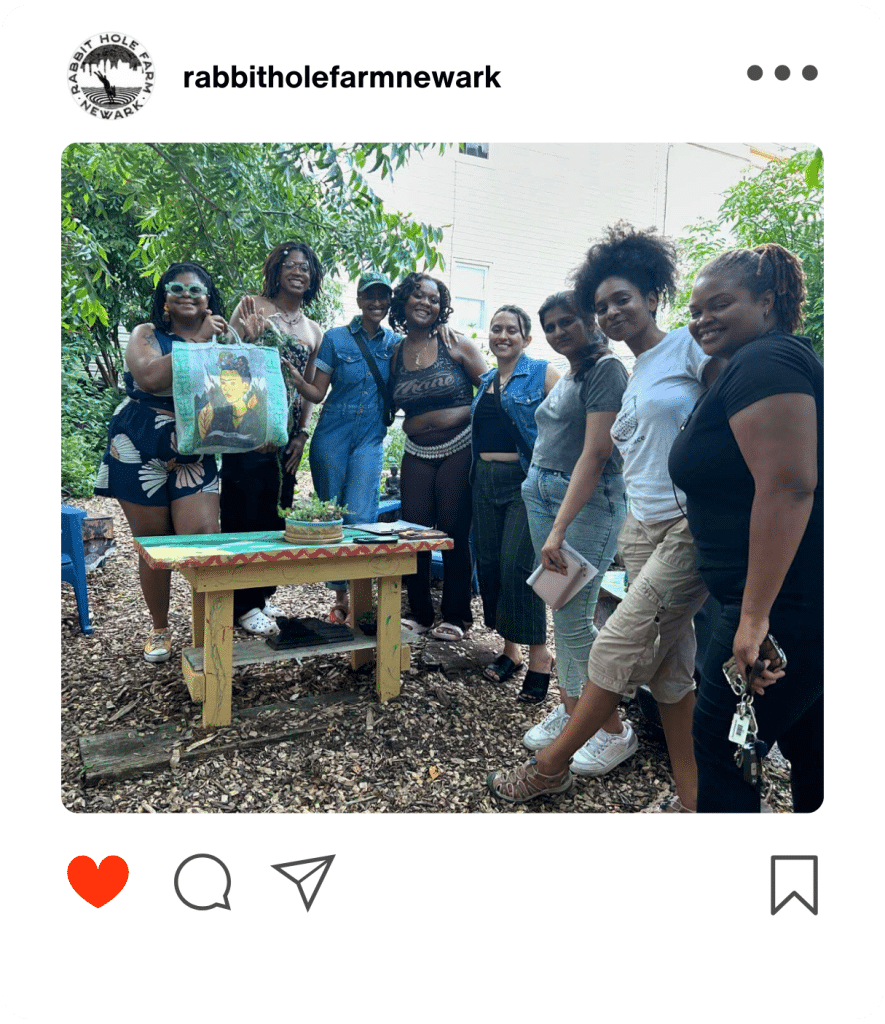
Herbalist Yaquana Williams hosted a Juneteenth plant exploration class at Rabbit Hole Farm in June 2024. Image from Rabbit Hole Farm’s Instagram.
Solutions focused on permanency
Panasci of the Urban Agriculture Cooperative said that long-term solutions that allow for food growing and local food markets in an urban environment are key.
“Our zoning is different here. Our density is different. When you combine that with the fact that we lack a cohesive urban agriculture policy at the local level.. it’s very hard for a farmer or farmer’s market to maintain land over time and … build infrastructure on it,” said Panasci.
On Fridays, Panasci and his team prepare farm boxes filled with kale, escarole, mushrooms, honey, and eggs. His organization sources inventory from more than 30 growers across the state before the team distributes the boxes to schools, food pantries, hospitals, and senior centers with limited access to fresh foods.
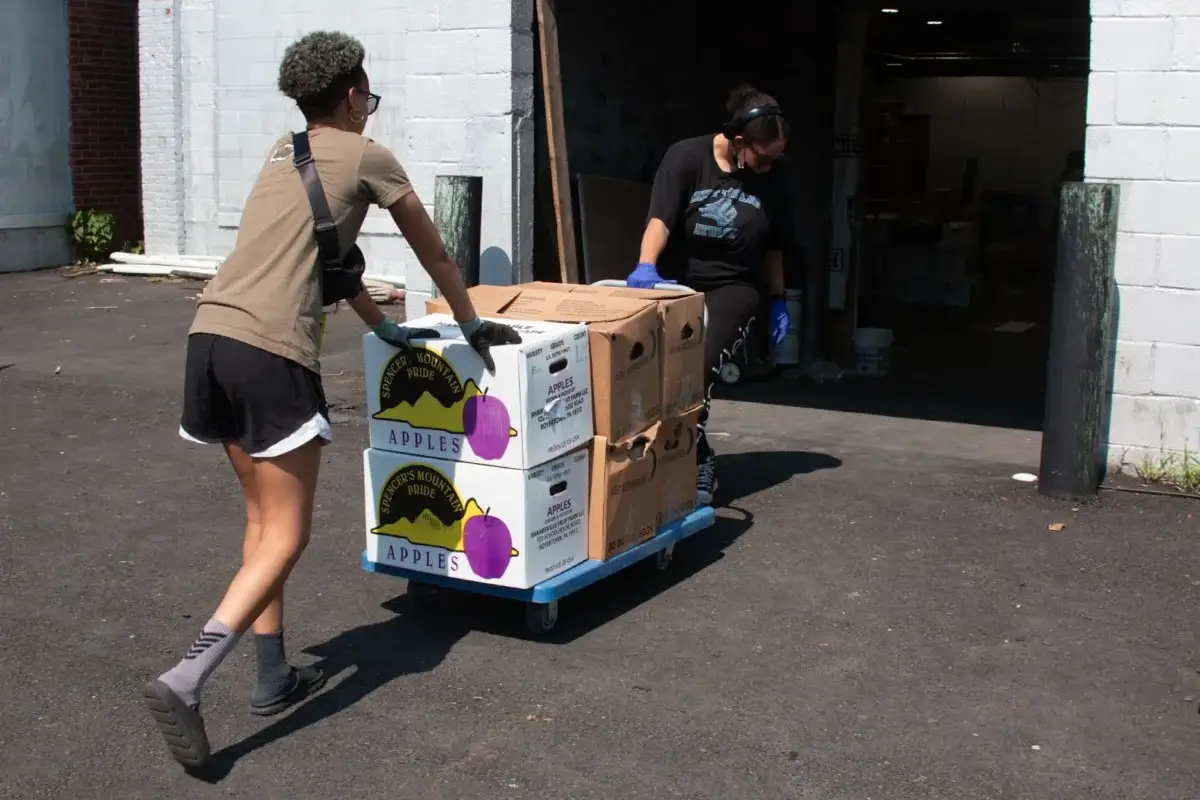
Urban Agriculture Cooperative staff prepare its farm-to-family boxes one afternoon in June 2024. Photo by Nikki VIllafane
Panasci emphasized that municipal support is critical for urban farms, which are especially vulnerable to gentrification and displacement from developers.
“Farming is hard in general, but urban farming when there’s not necessarily a real city system for it… it’s almost set up to not work [and] to really undermine you,” said Panasci.
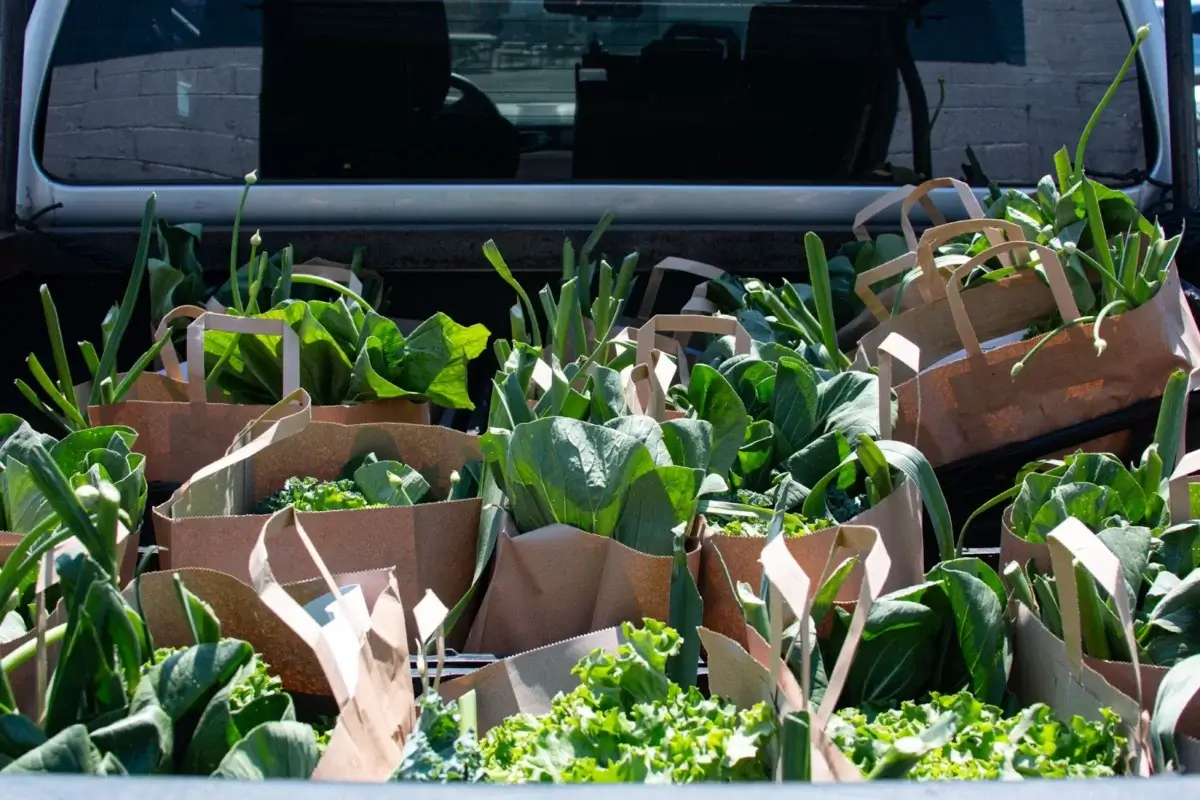
Urban Agriculture Cooperative distribution bags are loaded onto a pickup truck at their warehouse in Irvington, N.J. in June 2024. Photo by Nikki VIllafane
In the past few years, several bills have been introduced aimed at formalizing urban agriculture policies and sustaining the sector.
In January 2024, Assemblywoman Annette Quijano reintroduced a bill to establish an urban farming pilot program for emerging urban farms. Senator Teresa Ruiz and Senator Nellie Pou also reintroduced a bill that would establish an urban farming grant and loan program. Neither bill has made it out of committee for further consideration.
Jeanine Cava, executive director of the NJ Food Democracy Collaborative, points to the Massachusetts Healthy Food Incentive Program (HIP) as a potential model for what’s possible in New Jersey. This state-funded program reimburses SNAP users when they buy food from eligible HIP vendors.
“Right now, we don’t have dedicated state funding specifically for those kinds of incentives that incentivize people to buy locally produced food,” she said about the lack of permanent funding.
Davis of BIFU emphasized that Black and Brown farmers need to be at the center of any urban farming solution. BIFU’s statewide collective of 40 members plans to release their policy resolutions later this summer, which will include recommendations for land ownership and state funding for BIPOC farmers.
“We also need to give [politicians] some of the language of our ask… the community does need to do some work,” they said. “If you want your community to change, you gotta also advocate for your community.”
Learn more
Learn more about Montclair Community Farms and Rabbit Hole Farm’s upcoming programs and events.
You can also get involved with Urban Agriculture Cooperative, Black & Brown, Indigenous, Immigrant Farmers United, and NJ Food Democracy Collaborative via programming and advocacy opportunities.